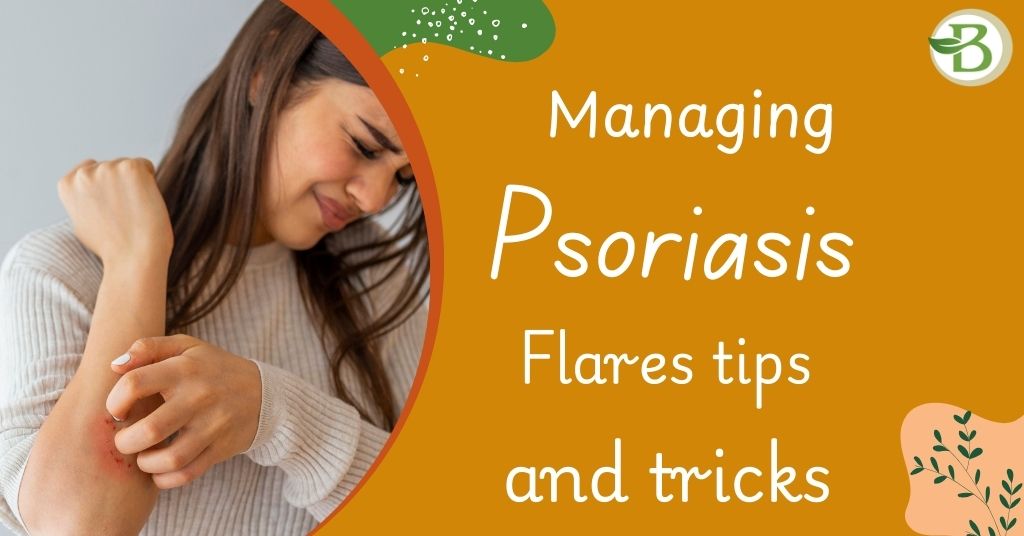How can you beat psoriasis with self-care?
People with psoriasis may frequently experience itching, irritation, and flare-ups. These itchy patches of flaky, scaly skin can significantly impact daily life, affecting clothing choices, outdoor activities, and overall mental health. While medication can help minimize psoriasis flare ups, taking optimum steps to manage triggers, including psychological stress, is also important.
Engaging in self-care is a powerful practice that can generate positivity, which in turn enhances motivation and self-worth. This can provide you with the energy and resilience needed to manage psoriasis. It all starts with recognising and addressing your own needs.
If you have this medical condition, it’s crucial to adhere to your doctor’s recommendations. Nonetheless, there are many things you can do independently to manage and avoid flare-ups. We will discuss multiple tips and tricks for self-care and effective management of symptoms during psoriasis, involving home remedies for psoriasis treatment. Read on to learn more.
Managing the itch with Home Remedies
Home remedies, utilizing natural ingredients, can help alleviate the severity of psoriasis. They can also reduce psoriasis symptoms without causing any side effects.
1. Aloe Vera: Aloe Vera is recognised as one of the top natural treatments for psoriasis. Using aloe vera gel on the skin up to three times daily decreases skin redness and scaling and helps to cure psoriasis naturally.
2. Turmeric: Turmeric is not just a favored spice in India and other nations; it’s also known for its antiseptic and anti-inflammatory benefits. The compound Curcumin in turmeric has been proven to alleviate psoriasis symptoms and lessen psoriatic flare-ups. Eating foods rich in turmeric or taking turmeric supplements can aid in managing psoriasis.
3. Tea Tree Oil: Applying tea tree oil to psoriasis patches can help prevent infections, reduce inflammation, and boost the immune system to enhance skin health. Research has validated the ability of tea tree oil to reduce psoriasis symptoms.
4. Sunlight: Exposure to natural light has been demonstrated to have a positive impact on alleviating psoriasis symptoms. Nonetheless, it is crucial to avoid excessive sunlight exposure, as it can exacerbate psoriasis symptoms in the event of sunburn.
Managing Psoriasis Flares with Self-care
Feeling alone due to psoriasis is common. You may think that nobody comprehends your situation. Yet, many others have experienced similar challenges and have come out stronger. You can, too. Here are a few tips for handling psoriasis in your daily life.
1. Manage Stress
Stress can lead to psoriasis flare-ups, making it vital to keep stress in check. Try relaxation methods such as mindfulness, deep breathing, or yoga to lower stress and enhance relaxation. This approach can:
Lower stress: Stress can aggravate psoriasis symptoms, so it’s important to manage stress levels.
Enhance relaxation: Relaxation techniques can aid in lowering stress and promoting a state of relaxation, which can lead to better overall health.
Improve sleep quality: Stress can interfere with sleep patterns, worsening psoriasis symptoms. By managing stress, sleep quality can be improved.
2. Stay Hydrated
Drinking a reasonable amount of water helps to eliminate toxins and maintain skin hydration. One must drink at least 8 to 9 glasses of water daily and steer clear of sugary beverages that can lead to dehydration. This strategy can:
Eliminate toxins: Water consumption aids in flushing toxins from the body, which can contribute to easing psoriasis symptoms.
Maintain skin hydration: Drinking water maintains skin hydration from the inside, minimising dryness and discomfort.
Boost digestion: Sufficient hydration can enhance digestion. Given the close connection between the gut and skin, improving digestion can aid in managing symptoms.
3. Get Enough Sleep
Lack of sleep can worsen psoriasis symptoms. Aim for 7-8 hours of sleep each night and maintain a consistent sleep schedule to support immune system regulation. This self-care strategy can:
Regulate the immune system: Sleep is crucial for immune system regulation, which is key to managing psoriasis symptoms.
Reduce inflammation: Sleep can help decrease inflammation, a common feature of psoriasis.
Improve mood: Getting enough sleep can elevate mood and reduce stress, which is beneficial for managing symptoms.
4. Educate Yourself and Others
Psoriasis carries a strong stigma. A common misconception is that psoriasis is contagious and can be spread from person to person. However, this is not true. Psoriasis is not infectious or contagious. Educating yourself and others about your condition can:
Make you comfortable: Being knowledgeable about your condition can help you adopt a new mindset: stress less, seek support and practice self-acceptance.
Busting myths: By taking the initiative to learn and share information with others daily, you can help dispel myths and misconceptions about psoriasis.
Relationships: Talking about your psoriasis with your loved ones can be challenging, but people who care about you want to know how to support you. Embrace these conversations.
5. Eat a Balanced Diet
A diet balanced in fruits, vegetables, whole grains, and lean proteins can help control symptoms. Avoid processed foods and carbonated drinks that can worsen symptoms. This approach can:
Lower inflammation: A balanced diet can help reduce inflammation, a key characteristic of psoriasis triggers.
Enhance digestion: A balanced diet can improve digestion, which is important for managing psoriasis symptoms.
Boost the immune system: A balanced diet can support the immune system, which is essential for managing psoriasis symptoms.
Psoriasis flare-ups can cause discomfort and impact your quality of life. Adhering to your treatment regimen is the most effective way to prevent flare-ups. In addition, these were some tips that might assist in managing your symptoms if they worsen. If your flare-ups do not improve, consult with a healthcare professional. They can assist in devising a permanent solution for psoriasis.
Unlocking the potential of homeopathy to treat psoriasis effectively
Homeopathy is a medical approach that employs extremely diluted natural ingredients to encourage the body’s own healing abilities. In this piece, we delve into how homeopathy is used to cure psoriasis without any side effects and its possible advantages for individuals dealing with this condition.
In homeopathy, the approach to treating psoriasis is comprehensive. The goal is to relieve the visible symptoms and address the root causes of imbalance within the body.Homeopathy is personalised to each individual and aims to revitalise the body’s life force, promoting balance, improved skin condition, and overall health.
Treatment with Bharat Homeopathy
In the quest for the most efficient and organic solution for psoriasis, Bharat Homeopathy stands out as the premier option. Our outstanding and impressive history proves our success, as we have effectively treated a variety of conditions. Our group of proficient and seasoned homeopathic doctors is entirely committed to delivering the utmost quality homeopathic treatment for psoriasis.
We adopt a thorough strategy, taking into account each patient’s unique requirements and the presence of white spots on the skin. Our group of medical professionals check in with our clients. They ask about any changes in their symptoms and provide advice on maintaining their diet. Homeopathic remedies are completely safe and reliable.


